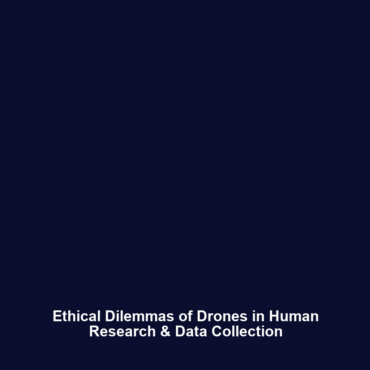Ethical Considerations of Using Drones for Human Research and Data Collection
The intersection of technology and scientific research has led to an increased use of drones for human research and data collection. However, the deployment of drones raises significant ethical considerations that demand thorough examination. Understanding these implications is crucial within the broader context of Drones in Science, especially as researchers strive to balance technological advancement with moral responsibilities. This article delves into the ethical frameworks governing the use of drones in human subjects research, aiming to shed light on vital principles and challenges relevant to Drones in Science.
Key Concepts of Ethical Considerations
When discussing the ethical considerations of using drones for human research and data collection, several key concepts emerge:
- Privacy: Protecting individual privacy is paramount. Drones should be used in a way that does not infringe upon the privacy rights of individuals being studied.
- Informed Consent: Researchers must obtain informed consent from participants, ensuring they understand the nature of the research and how their data will be used.
- Data Security: With the vast amounts of data collected, ensuring that information is securely stored and accessed only by authorized personnel is critical.
- Safety: The potential risks associated with drone operation must be evaluated to avoid harm to participants or communities.
Applications and Real-World Uses
The ethical considerations of using drones for human research and data collection manifest in various application scenarios:
- Public Health Studies: Drones are increasingly employed in health research to collect data on disease patterns while ensuring minimal intrusion in communities.
- Environmental Monitoring: Researchers utilize drones to gather data on populations and ecosystems, which raises ethical discussions about the environmental impact of such activities.
- Disaster Relief Research: Drones assist in gathering critical information during humanitarian crises, emphasizing the importance of safely and ethically handling sensitive data.
Current Challenges
Despite the growing application of drones, several challenges exist that hinder the ethical use of drones in human research:
- Regulatory Framework: Current regulations may not adequately address the nuances of drone technology in research settings.
- Public Perception: Distrust in drone technology can affect participant willingness to engage in research.
- Access to Technology: There remains a gap in access to drone technology for researchers from underfunded institutions.
Future Research and Innovations
Looking ahead, several innovations show promise for enhancing the ethical application of drones in human research:
- Advanced Data Encryption: Improved data security measures will help address privacy concerns and protect participants’ information.
- AI and Machine Learning: Utilizing AI can optimize data collection while adhering to ethical standards, ensuring compliance with consent and safety regulations.
- Community-Centric Approaches: Engaging communities in the design and implementation of drone studies can foster trust and transparency, promoting ethical practices.
Conclusion
In summary, the ethical considerations of using drones for human research and data collection are critical to successfully integrating this technology into the scientific field. Addressing issues of privacy, informed consent, and safety not only enhances the integrity of research but also strengthens trust between researchers and communities. As the field of Drones in Science evolves, it is imperative that ongoing discussions around ethics continue to shape the development and application of this innovative technology. For further reading on drone technology and ethical standards in scientific research, explore our related articles on ethical research practices and the impact of technology in science.

